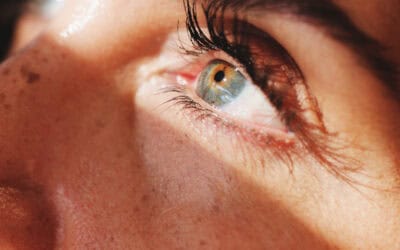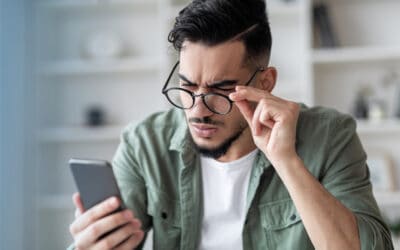Our long, sunny summer days in Pittsburgh not only allow more opportunities for outdoor enjoyment, but they unfortunately also create significant dangers for unprotected eyes. For example, the World Health Organization estimates that UV exposure causes up to 10% of cataracts worldwide. And recent survey results indicate that less than half of people buying sunglasses actually check the UV rating before purchasing, which can leave their eyes vulnerable to harmful radiation that silently damages vision.
This makes summer eye care a crucial part of your seasonal health routine.
The risks go far beyond mere discomfort. UV rays directly contribute to blindness-causing conditions like macular degeneration and cataracts that develop so gradually you won’t notice until permanent damage has occurred. Swimming with contact lenses exposes your eyes to microorganisms that could trigger infections and potentially lead to vision loss. And most people don’t realize that something as simple as wearing a hat with a 3-inch brim can block up to half of the UVB rays that typically damage eyes and eyelids.
Whether you’re planning pool days, backyard barbecues, or hiking adventures this summer, proper eye protection isn’t optional—it’s essential for preserving your sight.
The good news: basic preventive measures can dramatically reduce your risk while still allowing you to enjoy everything the summer season offers.
In this article we dive into several important ways to keep your eyes healthy through the summer, whether you are working or playing indoors or outdoors.
Protecting Your Eyes from the Sun
Summer sunshine in Pittsburgh does more than just warm up our city and suburbs. It also presents a serious threat to your eye health. UV radiation silently damages your eyes long before you notice any symptoms, making proper protection critical rather than optional.
Choose sunglasses with 100% UV protection
Not all sunglasses provide the protection your eyes need. When selecting sunglasses, look specifically for labels indicating 100% UV protection against both UVA and UVB rays. Some products use the term “UV400,” which means the same thing—complete blocking of harmful radiation.
Quality sunglasses should do more than just look stylish. For true eye safety, seek these essential features:
- Wraparound styles that block rays from entering the sides of your eyes
- Lenses dark enough to screen out 75-90% of visible light
- Gray-tinted options for accurate color perception
- Polarized lenses that cut glare reflecting off water and sand
If you are active with outdoor sports or yard work, invest in impact-resistant lenses made from polycarbonate or Trivex® materials as these types of lenses do not shatter if struck. The opticians at The Optical Shop at Chang Eye Group are trained to help you find and fit the most appropriate lenses and frames for you and your summer activities. We have a wide selection of styles to choose from at our eye care locations in Pittsburgh.
Why a wide-brimmed hat makes a difference
Even the best sunglasses leave your eyes partially exposed to UV light. Adding a wide-brimmed hat dramatically enhances your protection. A hat with at least a three-inch brim can block up to half of all UV rays that would otherwise reach your eyes and the delicate skin of your eyelids.
For maximum defense, choose hats labeled with UPF 50+, which block over 98% of harmful UVA and UVB radiation. The wider the brim, the better your protection: beach hats with 4- to 6-inch brims shield not just your eyes but also your neck and shoulders from damaging rays.
Avoiding peak sunlight hours (10 am to 4 pm)
UV radiation intensity peaks during midday hours between 10 am and 4 pm. During this window, your eyes face the greatest risk of damage from the sun’s most powerful rays.
Don’t wait for obvious symptoms to appear. When possible, schedule your outdoor activities before or after these peak hours. If midday activities can’t be avoided, take extra precautions by combining protective strategies: these include wearing quality sunglasses, a wide-brimmed hat, and taking frequent breaks in shaded areas.
Many people don’t realize that UV danger persists even on cloudy days. Check the local forecast for the UV index, which measures radiation intensity regardless of cloud cover or temperature.
Protecting your vision doesn’t mean avoiding summer fun, but rather it means preparing properly so you can safely enjoy outdoor activities. If you’ve noticed any changes in your vision or simply want personalized advice on eye protection, the experienced eye doctors in Pittsburgh at Chang Eye Group can provide the expert guidance you need.
Staying Safe Around Water
Summer pool days, lake trips, and ocean swims offer welcome relief from Pittsburgh’s heat, but they present serious risks to your eye health that many people completely overlook. Beyond UV protection, your eyes need specific defenses around water environments.
The risks of swimming with contact lenses
Never swim with contact lenses. This seemingly innocent habit creates a dangerous situation for your eyes. Contact lenses absorb water almost instantly, trapping bacteria, viruses, and other harmful microorganisms directly against your eye surface. This perfect storm leads to potentially serious eye problems:
- Eye infections that can develop within hours
- Painful corneal ulcers requiring intensive treatment
- Eye inflammation that can persist for weeks
- Chronic dry eye syndrome
The risk becomes particularly alarming with Acanthamoeba, a microscopic parasite found in virtually all water sources. This organism can cause Acanthamoeba keratitis, an extremely painful eye infection that in some cases leads to permanent vision loss. A good alternative to contact lenses is to wear prescription googles if you are very active in water activities.
How to choose the right swim goggles
Quality swim goggles create an essential barrier between your eyes and potentially harmful water. When selecting goggles, focus on three key elements: proper fit, comfort, and clarity.
When shopping for new googles, many people mistakenly focus on the strap. However, it is the seal between the googles and face that determines whether water stays out from your eyes. When trying on goggles, you should feel a brief suction against your eye sockets—anything less means they’ll leak; anything more signals they’re unnecessarily tight.
The environment where you swim should determine your lens color choice. Clear lenses work best for indoor pools, while smoke or mirrored options reduce outdoor glare. Blue or amber lenses offer versatility for both settings.
Dealing with chlorinated or salty water
Chlorine kills harmful bacteria in pools but can also damage your eye’s corneal epithelium, causing redness, itching, and irritation. Ocean water presents a different challenge as it contains almost four times more salt than your natural tears (3.5% versus 0.9%). This drastic difference in salt content explains the painful stinging you may feel when you get saltwater in your eyes.
After any water exposure, rinse your eyes thoroughly with clean water or saline solution to remove lingering irritants. Using preservative-free artificial tears before and after swimming creates an additional protective barrier against dryness.
Eye irritation that persists more than a few hours after swimming requires professional attention. For personalized summer eye care advice or if you experience unusual discomfort after water activities, contact us for an evaluation at Chang Eye Group. Getting early treatment can prevent serious complications with your vision.
Environmental and Lifestyle Factors
Summer brings more than just sun and water risks to your eyes. There are also several environmental factors that can silently threaten your vision during the warmer months. Many people recognize the dangers of UV rays but completely overlook these equally important threats to eye health.
Dry eye triggers: wind, fans, and AC
Your home environment might secretly sabotage your eye comfort even on pleasant summer days. Air conditioning removes critical moisture from the air, causing your natural tears to evaporate too quickly. Using ceiling fans and floor fans can create a double problem: they stir up dust and allergens while simultaneously creating constant airflow that dries your eyes.
These seemingly innocent cooling methods can trigger significant dry eye symptoms that worsen over time. Your eyes naturally produce tears to maintain comfort and clear vision, but this system gets disrupted when surrounded by artificially dry air.
To protect your eyes from these hidden threats:
- Position AC vents away from your face
- Add a humidifier in heavily air-conditioned rooms
- Run ceiling fans at lower speeds
- Apply lubricating eye drops before entering dry environments
How summer allergies affect your eyes
Summer allergies transform otherwise beautiful days into miserable experiences for your eyes. Pollen from grasses and weeds peak during the summer, while mold thrives in Pittsburgh’s hot, humid conditions. When these allergens contact your eyes, they trigger histamine release, causing redness, itching, excessive tearing and swollen eyelids.
Your eyes’ protective mechanisms actually work against you during allergy season. The more your eyes water to flush out allergens, the more vulnerable they become to further irritation as tear ducts get overworked and eyelid tissues become inflamed.
Wraparound sunglasses create a physical barrier against airborne allergens. Additionally, timing your outdoor activities can dramatically reduce exposure as pollen counts typically remain lower until late morning hours and will also drop after rainfall.
The role of hydration and diet in eye health
Your tear production is directly dependent on your hydration levels. When you’re dehydrated, your body prioritizes essential functions over tear production, leaving your eyes vulnerable to irritation and inflammation. During hot summer days, you should aim to drink 8-10 glasses of water each day to maintain optimal eye moisture.
Your diet also plays a key role in your eye health. Foods rich in omega-3 fatty acids support the oil layer of your tear film, preventing premature evaporation. Meanwhile, vitamins A and C along with antioxidants protect against cellular damage from increased UV exposure. Include cucumber, watermelon, and citrus fruits in your summer diet to get both hydration and essential nutrients for your eyes.
Avoid rubbing your eyes during allergy season
Despite the intense itching that summer allergies cause, rubbing your eyes creates a dangerous cycle. The physical pressure temporarily relieves itching but releases more histamine, ultimately worsening your symptoms. Even worse, rubbing can damage delicate corneal tissue and introduce new irritants and pathogens to your eye surface.
Instead of rubbing, try applying cool compresses to reduce inflammation. Regular use of preservative-free artificial tears will help flush allergens while moisturizing irritated tissues.
If you experience persistent symptoms, our optometrists can recommend specific allergy eye drops that target the underlying immune response without the risks of physical rubbing.
Everyday Habits That Support Eye Health
Your daily routines play a surprising role in protecting your vision during summer months. We have already discussed the benefits of specialized sunglasses and precautions you should take for swimming and other outdoor activities, however these simple practices will also dramatically reduce your risk of both immediate injury and long-term vision damage.
Apply sunscreen carefully around the eyes
Five to ten percent of all skin cancers occur on the eyelid, yet most people completely skip this vulnerable area when applying sunscreen. The delicate skin around your eyes needs protection, but standard chemical sunscreens often cause stinging and irritation when you sweat.
Instead, choose mineral-based sunscreens containing zinc oxide or titanium dioxide specifically formulated for sensitive skin. These create a physical barrier against UV rays without the chemical irritants. Stick sunscreens work exceptionally well around the eyes since they won’t melt and run into your eyes during outdoor activities.
Wear protective eyewear during yard work
Half of all eye injuries happen at home, with as many as 90% being preventable if proper eye protection was used. Your typical weekend yard work exposes your eyes to multiple hazards that can cause permanent vision damage in seconds.
Even seemingly harmless gardening can expose your eyes to plant sap, fertilizers, and allergens that cause serious irritation and potential damage. Here are some considerations for effective protection during landscaping and home projects:
- Choose wraparound styles that block debris from all angles
- Select impact-resistant materials like polycarbonate that withstand flying objects
- Consider photochromic lenses that automatically adjust to changing light conditions
Get enough sleep to reduce eye strain
Quality sleep does far more than simply refresh your mind: a good night of sleep will directly impact your long-term eye health.
During sleep, your eyes complete essential repair processes that can’t happen while you’re awake. Your tears replenish, blood circulation improves, and waste products are cleared from your eyes.
Chronic sleep deprivation significantly increases your risk of developing serious eye conditions like glaucoma and macular degeneration. Your eyes, like the rest of your body, need consistent rest patterns to function properly.
Aim for regular sleep schedules rather than “catching up” on weekends.
Schedule your annual eye exam
Regular eye exams detect problems before you notice any symptoms. Eye doctors can identify signs of over 270 systemic diseases including diabetes and high blood pressure just by examining the blood vessels in your retina.
Don’t wait for obvious symptoms to appear. Many serious eye diseases develop with no early warning signs, silently damaging your eyesight before you notice anything wrong. You can save your own vision through early detection with an experienced eye doctor.
For personalized summer eye care advice or if you’re experiencing any unusual eye symptoms, schedule a comprehensive eye exam at Chang Eye Group in Pittsburgh to ensure your eyes stay healthy throughout the summer and beyond.
Enjoy Summer with Healthy Eyes
Summer days offer endless opportunities for outdoor enjoyment, but they quietly present serious risks to your eye health. Your eyes face numerous challenges that develop so gradually you might not notice until permanent damage has occurred. From harmful UV radiation and water-related dangers to environmental irritants and lifestyle factors, your vision needs deliberate protection throughout the season.
The facts are clear: once vision is lost, it can’t always be restored, but vision problems caught early can often be effectively treated. Quality sunglasses with 100% UV protection, wide-brimmed hats, and strategic timing of outdoor activities significantly reduce your risk of developing sight-threatening conditions like cataracts and macular degeneration. Similarly, never swimming with contact lenses and using appropriate goggles prevents potentially dangerous infections that could permanently damage your eyesight.
Indoor environments pose their own threats. Air conditioning, fans, and seasonal allergies trigger dry eye symptoms that compromise both comfort and health. Your daily habits make a tremendous difference as well—proper hydration, careful sunscreen application around the eyelids, protective eyewear during yard work, and adequate sleep all contribute to maintaining healthy vision.
Don’t wait for obvious symptoms to appear. Vision loss happens with virtually no pain and develops so gradually that you won’t notice changes until serious damage has already occurred.
Taking proactive steps today dramatically reduces your risk while still allowing you to enjoy everything summer offers.
Remember that everyone’s eyes have unique needs. If you have concerns about your vision or need personalized advice, schedule an eye exam today at one of our convenient locations. Chang Eye Group provides the professional guidance you need to safeguard your sight through Pittsburgh’s beautiful summer days and beyond.
FAQs
Q: How can I best protect my eyes during summer activities?
A: Wear sunglasses with 100% UV protection, use a wide-brimmed hat, and avoid outdoor activities during peak sunlight hours (10 am to 4 pm). Also, use artificial tears to keep your eyes moist in dry conditions and wear protective eyewear during activities like yard work.
Q: Is it safe to swim with contact lenses?
A: No, swimming with contact lenses is not healthy for your eyes. Contacts can absorb water and trap harmful microorganisms against your eye, potentially leading to infections or even vision loss. If you must wear contacts while swimming, use daily disposables with watertight goggles and discard them immediately after.
Q: How does summer weather affect eye health?
A: Summer weather can trigger dry eye symptoms due to wind, fans, and air conditioning. Allergies can cause eye irritation, while UV exposure increases the risk of conditions like cataracts. Stay hydrated, use lubricating eye drops, and protect your eyes from UV rays to maintain eye health during summer.
Q: What should I look for when choosing sunglasses?
A: Look for sunglasses that offer 100% UV protection (or UV400). Consider wraparound styles to block side entry of UV rays, lenses that screen out 75-90% of visible light, and polarized options to reduce glare. For outdoor activities, choose impact-resistant lenses like polycarbonate or Trivex®.
Q: How often should I have my eyes examined?
A: It’s recommended to have an annual eye exam, even if you don’t have vision problems. Regular check-ups can detect early signs of eye diseases when treatment is most effective. Eye doctors can also identify signs of systemic health issues like diabetes or high blood pressure during a comprehensive eye exam.





